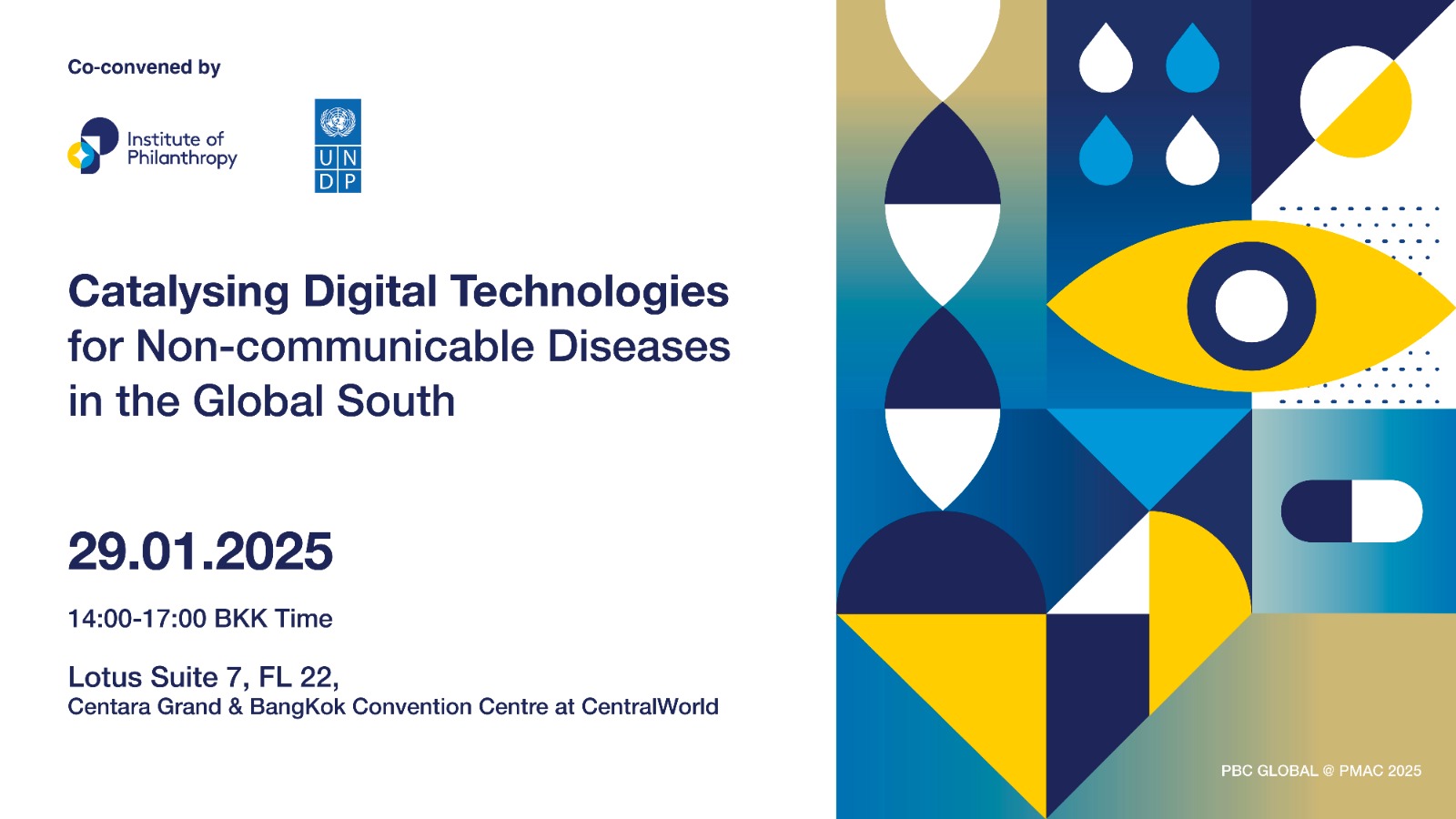Side Meetings
SMB128
Catalysing Digital Technologies for Non-communicable Diseases in the Global South
29
Jan
- Institute of Philanthropy
- United Nations Development Programme

Session 1: The Use Cases of Innovative Technologies on NCDs
Use of innovative technologies in clinical and public health interventions have been more and more popular in recent years, driven by the rapid development of the technology sector. These technologies have proven to be not only life-saving but also cost-effective across various disease areas, particularly in the prevention, diagnosis, treatment, and monitoring of NCDs.
NCDs account for more than 74% of global deaths, posing huge challenges for achieving Sustainable Development Goal 3.4. To effectively manage the health burden associated with NCDs and achieve universal health coverage, there is an urgent need for a new set of tools and interventions.
The management of NCDs warrant continuous, regular monitoring and long-term care. Innovative technologies offer a robust package of solutions to enhance the management of NCDs. For example, real / near-time monitoring data can assist healthcare professionals in tracking patients’ conditions and informing clinical management decisions. Additionally, digital tools can help patients overcome barriers to accessing healthcare; telemedicine, for instance, enables remote consultations.
However, there remains a significant gap in the adoption of medical technologies within the region. To improve patient outcomes and reduce healthcare costs, it is essential to accelerate the utilisation of the latest technologies in managing NCDs. Addressing this gap will not only improve patient outcomes but also contribute to more sustainable health systems across societies.
Session 2: How shall we finance South-South collaboration in the area of technologies and NCDs?
Gaps persist between the countries and regions regarding the utilization of technologies in managing NCDs. These disparities can be attributed to the readiness and preparedness of health systems, the capacity of national health workforces, political commitment, and the availability of robust digital health plans. Consequently, there is a pressing need for resource mobilisation among regional partners to invest in technologies that address NCDs effectively.
According to the WHO and ITU (International Telecommunication Union), a modest investment of an additional US $0.24 per patient per year in telemedicine, mobile messaging and chatbots could save more than 2 million lives and gain around 5 million life years in the next decade. This underscores a compelling case to invest in technologies in NCDs, as small investment will generate substantial return on health and economic outcomes.
However, securing the necessary investments alone is insufficient. One of the strategic initiatives under WHO Global Strategy on Digital Health 2020-2025 emphasises the importance of global collaboration. Collaborations between government entities, private sectors such as the technology industry, civil society organisations and philanthropic sector can leverage the expertise and resources to facilitate the application of technologies in NCD management. It will also lead to more efficient use of resources and resulting in an evidence-based strategic plan.
To pave the way forward for the Global South in leveraging digital technologies for NCD management, it is essential to initiate discussions focused on financing multi-sectoral collaborations. Addressing these gaps through coordinated efforts will not only enhance healthcare delivery but also ensure that technological advancements benefit populations in need across regions.
Against this backdrop, the Institute of Philanthropy and United Nations Development Programme will co-host a side meeting at PMAC 2025 focusing on the adoption of the digital technologies in the prevention, diagnosis, control and management of non-communicable diseases (NCDs) in the Global South.
Session 1: The Use Cases of Innovative Technologies on NCDs
This panel discussion convenes leaders from UN agencies, governments and NGOs to share their experiences with using digital technologies in NCDs management. The objectives of the panel discussion are as follows:-
• Showcase the use of innovative technologies on NCDs prevention and management;
• Share key learnings and best practices to promote wider uptake and adoption of these technologies in the region;
• Address challenges associated with adopting innovative technologies in NCDs, such as barriers to access, digital divide, etc.; and
• Facilitate knowledge exchange and collaboration among stakeholders, fostering potential partnerships.
- Juwang BAIK, Korea Foundation for International Healthcare
- Dr. Rolando Enrique DOMINGO, World Health Organization Regional Office for the Western Pacific
- Rahul MULLICK, Resolve to Save Lives
- Chioma S. NWACHUKWU, Gavi, the Vaccine Alliance
- Dr. Chang LIU, ASK Health Asia (moderator)
Session 2: How shall we finance South-South collaboration in the area of technologies and NCDs?
This panel discussion brings together prominent funders in the region to explore financing strategies to enhance South-South collaboration in the realm of technologies and NCD, the objectives of the discussion are to:-
• Outline current financing practices and collaborative efforts related to digital technologies and NCDs;
• Discuss potential pathways to mobilise resources in fostering South-south collaboration; and
• Facilitate conversations between potential funders and partners to identify collaborative opportunities.
- Neeraj Jain, PATH
- Dr. Marelize Gorgens, The World Bank
- Dr. Manish PANT, UNDP Digital Health for Development Hub
- Dr. Indah Susanti DONIMANDO, Ministry of Health, Indonesia
- Carrie LIU, World Economic Forum (moderator)

